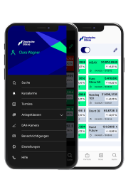Top / Flop ►
| Name | Prev. Day | Last Price |
|---|---|---|
| Name | Prev. Day | Last Price |
Most Traded ►
| Name | Turnover in Euro | Last Price |
|---|
Market indicators
New issues
The inclusion of shares in trading on the Open Market is published on deutsche-boerse-cash-market.com:
About Equities
Shares are securitized portions of the share capital of a company with the legal form of a stock corporation. Shares may be tradable on a stock exchange, but this is not mandatory. Prices are determined by supply and demand. When selling, the bid price is important for investors, and when buying, the ask price is important. As soon as the price and quantity of a purchase match a sale, the orders are executed, the trade is made, and a transaction is completed.
Investors want a return on their stock investment, for which, in addition to the price gain, the dividend decided at the annual general meeting is also relevant. The dividend is the portion of the profit that is distributed to shareholders.
In order to reflect the performance of different markets (countries, sectors, etc.), stocks are often divided into indices. These serve as a mirror for the stock market. The most important German indices are the DAX, TecDAX, MDAX, and SDAX.
The international stock market is represented by international indices such as the Euro Stoxx 50, S&P 500, Nasdaq 100, and Nikkei 225.
The current status of the DAX, the most important German stock index, also reflects German blue chip stocks. These are the 40 stocks with the highest market capitalization, whose companies enjoy a high level of international recognition. With the help of the ISIN or WKN, stocks can be clearly identified and their performance can be viewed as charts on the Deutsche Börse Frankfurt website.
Investors can trade around 1,000 stocks on the Xetra trading platform. It is the most important stock exchange for German stocks. In Frankfurt's specialist trading on the trading floor, around 10,000 stocks are offered, most of them foreign securities.
Companies can be listed in three different segments: Prime Standard, General Standard, or Open Market, with the transparency requirements being lowest in the Open Market, formerly known as the over-the-counter market.





